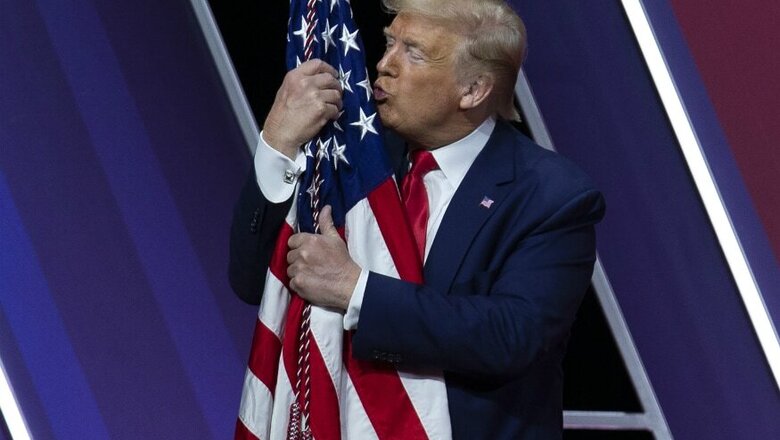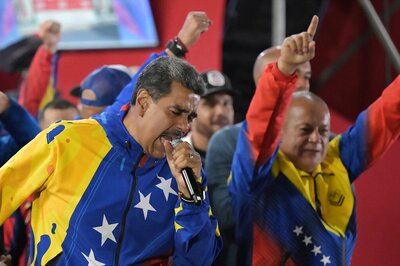
views
George Orwell’s 1984, a 20th century classic, nicely depicted the perversions of communist state and society. One may be tempted to believe that the world he portrayed has ceased to exist, along with its innovations like doublethink and newspeak. Sadly, it hasn’t; this is evident from the still widespread anti-Americanism, which recently got a spurt with US President Donald Trump’s visit.
The RSS-affiliated Swadeshi Jagaran Manch (SJM) is against any tariff concessions to Washington. “If it is related to the livelihood of the people or religious issue or supplementation of the farmers’ income, one cannot support [it],” SJM national co-convener Ashwini Mahajan said against the backdrop of reports that India may open up the dairy and poultry sector for American firms.
Communist Party of India (Marxist) general secretary Sitaram Yechury is also unhappy with Trump’s maiden visit to India. He said, “We are worried over his visit. The US President is coming to draw concessions for US farmers.”
We are all America-hating Leftists now.
India’s relationship with America has been unique. In an article (November 29, 2009, The Economic Times), Swaminathan Aiyar wrote, “During the Cold War, India’s governmental relations were warm with the USSR and cool with the US. But a million Indians migrated to the US while none went to the USSR.” Today, this number runs into millions.
Why? India is a democracy, so its political class is supposed to reflect the views, feelings, and aspirations of the people. But why was it that while the people of India felt, and feel, at home in Washington, New York, and other US cities (and in the West in general), our leaders found friends in Moscow and Jakarta? (But, typically, even as Indian rulers got friends in Moscow and Jakarta, they preferred the West for medical treatment, their children’s career, etc; another instance of hypocrisy).
India and the US have had strong economic ties (the US is the biggest trade partner), social and cultural relations, but the political ties have often lacked warmth; at times, there was pronounced hostility between the world’s two biggest democracies.
It is actually worse than hypocrisy; it is an instance of doublethink on the part of most Indians, both of liberal and conservative dispositions. And not just politicians. Doublethink is explained in 1984 as: “To know and not to know, to be conscious of complete truthfulness while telling carefully constructed lies, to hold simultaneously two opinions which cancelled out, knowing them to be contradictory and believing in both of them, to use logic against logic, to repudiate morality while laying claim to it, to believe that democracy was impossible and that the Party was the guardian of democracy…”
Doublethink is worse than hypocrisy because the hypocrite at least knows that there is a difference between his public pronouncements and private practice; when he promotes prohibition and teetotaler-ism while enjoying his drinks at his home, he conceals his love for alcohol; this concealing is admission of his awareness that he is being hypocritical. He knows that promoting prohibition and drinking are unacceptable; he may develop a guilty conscience.
The doublethinker, however, is unburdened with a guilty conscience. The Leftist politician or intellectual rails against the West in general and America particular all the time; yet, he brandishes his degree from a prestigious American university. Indeed, it is usually his degree that makes him prominent in the first place. How many pinkish professors from Magadh and Rohelkhand Universities, for instance, you recall getting their articles published in English newspapers?
Similarly, the middle-class, Modi-voting gentry proudly advertise how their son got a green card in the US and the daughter got permanent residency in Canada. At the same time, in the best sanskari traditions, they also express their disapprobation at the ‘materialistic’ Western values.
When our political and thought leaders, commies and conservatives, middle and upper class people send their kids to America, when they settle in Canada, when they go there for medical treatment, they implicitly support the system that has made Western nations richest and freest in the world. That system, despite country-wise variations, has four essential elements — capitalism, free speech, individual responsibility, and limited government.
But all of them gang up to torpedo any move towards any of the above-mentioned elements. They malign capitalism — which is “the only system in history where wealth was not acquired by looting, but by production, not by force” (Ayn Rand), call it as exploitative and inhuman. They fight against freedom of expression. They promote freebies and big government.
When overbearing socialism, stifled creativity, and big government make life miserable, they go to America, enjoy a good life. They keep their avenues open — and shut all prospects for India’s development.
(The author is a freelance journalist. Views are personal)

















Comments
0 comment